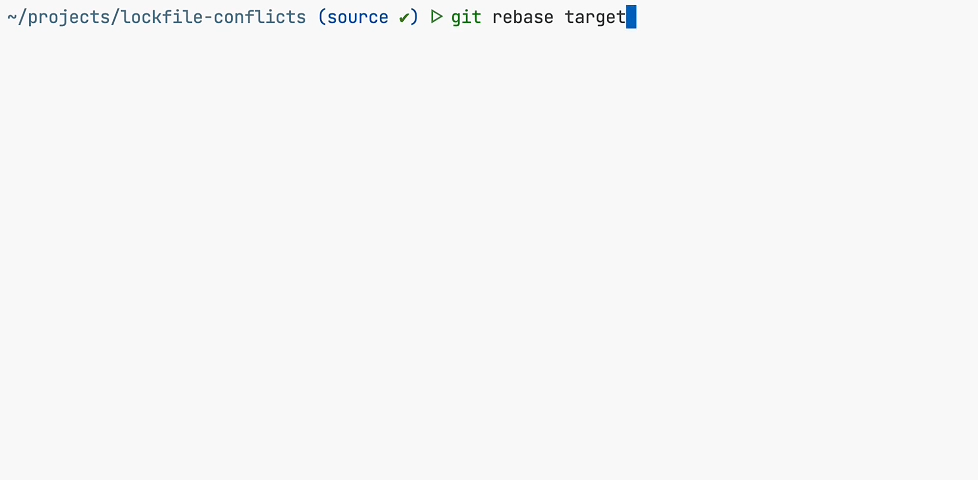
Security News
/Research
Wallet-Draining npm Package Impersonates Nodemailer to Hijack Crypto Transactions
Malicious npm package impersonates Nodemailer and drains wallets by hijacking crypto transactions across multiple blockchains.
lockfile-conflicts
Advanced tools
A custom merge driver, aims to handle lockfile conflicts automatically in merge/rebase process.
Helps to merge lockfile conflicts and update automatically after merge/rebase.

First of all, install the dependencies in your project.
pnpm install lockfile-conflicts -D
Edit package.json > prepare script and run it once:
npm pkg set scripts.prepare="lockfile install"
npm run prepare
And then commit the changes made by the command. After installed, a custom merge driver will be defined and applied to merge certain files.
In order to execute custom scripts automatically at proper time, we need to inject some shell script to git hooks, which may cause conflicts with other git hook tools, e.g. husky, simple-git-hooks and so on.
In this case, you can place install script right after theirs. For an example:
{
"scripts": {
"prepare": "husky install && lockfile install",
"prepare": "simple-git-hooks && lockfile install",
"prepare": "<other git hooks tool> && lockfile install"
}
}
When it was installed. it has done these things:
git config -l --local.Don't worry, all of these can be removed easily by execute npx lockfile uninstall [--force], they can hardly make pollution.
This section is revised from Example of how to configure a custom git merge driver
A merge driver defines how git merge a certain file, it usually uses with .gitattributes. For more, visit Docs - Git Attributes.
This is done in the .git/config file using git config command:
git config merge.[driver-name].name xxx
git config merge.[driver-name].driver xxx
[merge "lockfile-conflicts"]
name = A custom merge driver used to resolve conflicts in certain files
driver = lockfile merge %O %A %B %P
The merge block contains the merge driver's identifier, it
's lockfile-conflicts here, used to reference the merge driver later.
The name property contains a description of the merge driver, this project doesn't use this property because it's not necessary.
The driver property contains the command that will be called when a conflict occurs. There's a handful of predefined parameters, most notably:
%O: ancestor’s version of the conflicting file%A: ours version of the conflicting file%B: theirs branch's version of the conflicting file%P: the conflicting file relative pathNote: Any tools or scripts called by the merge driver must be available on $PATH.
Add patterns you want the merge driver to be used for in the .gitattributes file:
# .gitattributes
*pnpm-lock.yaml merge=my-custom-driver
Note that, much like git hooks, the .git/config file can't be checked in/shared through the repository.
A common way of distributing merge drivers is to check the configuration file in elsewhere and provide a script to copy it to .git/config.
In this project, the step above is included by lockfile install command.
runAfter to be triggered weirdly?We execute runAfter by checking if there's a conflicts information file exist.
The file will be recorded in a temp location under the config directory when it happened, and will be removed when you successfully rebase or merge. All of these steps depend on specified git hooks and also will be triggered by them.
But unfortunately, the lifecycle hooks that git provides are incomplete, which means we'll lose context and causes temp file remains if you abort a rebase or merge process.
Next time you succeed to make a commit action, the post-commit hook triggers as usual but it will execute runAfter because the temp file exist. This is why the case happens.
Don't worry about this, because we'll delete temp file first to avoid mis-executing and these hook won't affect your commit result. Just ignore it and then everything will be okay in next execution.
Please read the documentations of these useful tools before developing:
PR welcome if you have any constructive suggestions. PR welcome if you have any constructive suggestions.
FAQs
A custom merge driver, aims to handle lockfile conflicts automatically in merge/rebase process.
The npm package lockfile-conflicts receives a total of 2 weekly downloads. As such, lockfile-conflicts popularity was classified as not popular.
We found that lockfile-conflicts demonstrated a not healthy version release cadence and project activity because the last version was released a year ago. It has 1 open source maintainer collaborating on the project.
Did you know?

Socket for GitHub automatically highlights issues in each pull request and monitors the health of all your open source dependencies. Discover the contents of your packages and block harmful activity before you install or update your dependencies.

Security News
/Research
Malicious npm package impersonates Nodemailer and drains wallets by hijacking crypto transactions across multiple blockchains.

Security News
This episode explores the hard problem of reachability analysis, from static analysis limits to handling dynamic languages and massive dependency trees.

Security News
/Research
Malicious Nx npm versions stole secrets and wallet info using AI CLI tools; Socket’s AI scanner detected the supply chain attack and flagged the malware.